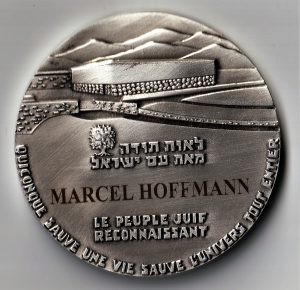
Marcel Hoffmann
Marcel Hoffmann was one of at least 25 French railway workers from Lille, northern France, who, in 1942, helped more than 40 Jewish children and adults escape deportation.
Image: Collection Yad Vashem
While I was led away, Marcel Hoffmann took out his identity card to show the German soldier, telling him: “See, I have a German name, too.”
Oscar Jacques Stulzaft, survivor of the Holocaust
Railway company collusion
Born on 25 July 1902, Marcel Hoffmann was a railway worker in Lille for Société Nationale des Chemins de Fer Français (SNCF), the French national railway company. During the German occupation of France, it was used, like many other European railway companies, to support the German war machine and the deportation of millions of people, the majority of them Jewish, to transit, concentration, and extermination camps.
Despite decades of denying playing a collaborative role in the deportation of Jews, in 2006 SNCF and the state of France were found guilty of collusion with the Nazis in a historic US court case. The case was brought by Alain Lipietz, then a Green Party Member of the European Parliament, and his sister, on behalf of their father who survived being deported to the Drancy internment camp in 1944.
The Lille-Fives Rescue Operation
On 11 September 1942 – the eve of Rosh Hashanah (Jewish New Year), Jewish adults and children from Lille were rounded up by the occupying Nazis and taken to the Lille-Fives train station. From there they were being deported to the Mechelen transit camp in Belgium and later directly to Auschwitz-Birkenau. Marcel Hoffmann and other railway workers noticed the roundup and decided to act in a spontaneous rescue operation that put their own lives at risk.
Marcel distracted the German guards, while other railway workers pretended to be a group of cleaning staff and helped many of the Jews to escape and hide in an abandoned warehouse on site. Oscar Jacques Stulzaft, one of the Jewish children rescued that day, described this moment in an interview:
While I was led away, Marcel Hoffmann took out his identity card to show the German soldier, telling him: “See, I have a German name, too.”
– Oscar Jacques Stulzaft in an interview with France 3 (July 2016)
In a personal note, Marcel Hoffmann described the rescue operation himself:
… Not listening to anything but my patriotism and out of humanity, despite the danger, I slipped into the group and used cunning. From 1 pm to 11 pm I succeeded in saving around 40 children and adults. They were taken in and provided shelter by helpers for the rest of the German occupation ….
– (A personal note by Marcel Hoffmann)
What makes this operation exceptional is that it did not end with the rescue of the deportees from the hands of the soldiers, but a large number of them, particularly children, were taken in by the families of the rescuers themselves.
Out of the Jews who were rescued on 11 September 1942 by Marcel Hoffmann and his colleagues, 41 have been identified so far. On that very day, almost 500 people in total, including Jews from Northern France, were deported from the Mechelen transit camp to Auschwitz-Birkenau. Of these 500, only 15 returned.
This event was researched by Grégory Célerse, a local historian from Lille, and published as a book in 2017, bringing more attention to the actions of these brave rescuers.
The Stulzaft Family
10 year old Oscar Jaques Stulzaft was rescued on that day together with his mother Hélène and his brother Jean, who was 2 years old at the time. Jean and Oscar Jacques were hidden separately by two railway worker families, but on 8 November 1942, Oscar Jacques and the family hiding him were trapped under debris during a bombardment. They survived and one of the people who helped find them was, once again, Marcel Hoffmann. Marcel saved Oscar Jacques’ life a third time when, in the hospital after the bombardment, he noticed a nurse acting suspiciously. Marcel realised she may have been calling the Gestapo (the German secret state police, notorious for brutality) and he warned Oscar Jacques’ mother to take him away and hide.
Oscar, his mother and brother remained in hiding until the liberation of France in 1944. After the war, Marcel stayed in contact with the Stulzaft family until he died on 6 September 1957.
In 2016, in honour of the events of 11 September 1942, a plaque at the former train station of Lille-Fives was unveiled in a ceremony attended by Oscar Jacques Stulzaft and Marcel Hoffmann’s daughter Monique. The plaque includes the names of all identified saved children and their rescuers – and space for all names that might be found in the future.

Marcel Hoffmann’s Righteous Among the Nations medal © Collection Yad Vashem
Righteous Among the Nations
On 25 of February 2020, Marcel Hoffmann was posthumously awarded the title ‘Righteous Among the Nations’ – the first of the lifesaving railway workers to receive this award. 24 other workers have been identified so far. This medal is awarded by Yad Vashem (Israel’s Holocaust remembrance centre, memorial and museum) to non-Jews who risked their own life during the Holocaust to save Jews from being persecuted and murdered. During the ceremony, French Senator Roger Karoutchi said:
There is no nationality in courage, there is no nationality in heroism. When the risk is high, there is simply humanity.


